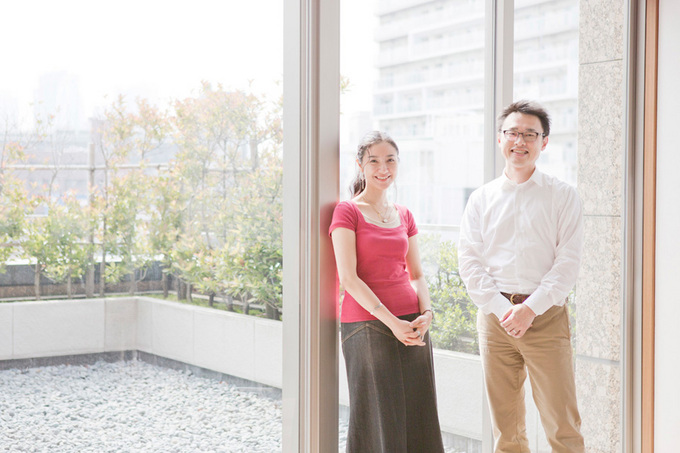For a Real Understanding of the Islamic World
Ken Miichi x Karima Elsamny Morooka
Karima Elsamny Morooka, author of Islam kara kangaeru (Thinking from the Islamic perspective), has been attracting attention for her real accounts of the Islamic world and her sharp insights. Ken Miichi is a researcher studying Southeast Asian politics and the Islamic movement in Indonesia in particular. Bringing them together offers a wonderful opportunity to learn about how Muslims are treated in Japanese society and the diversity of the Islamic world beyond the borders of the Middle East.
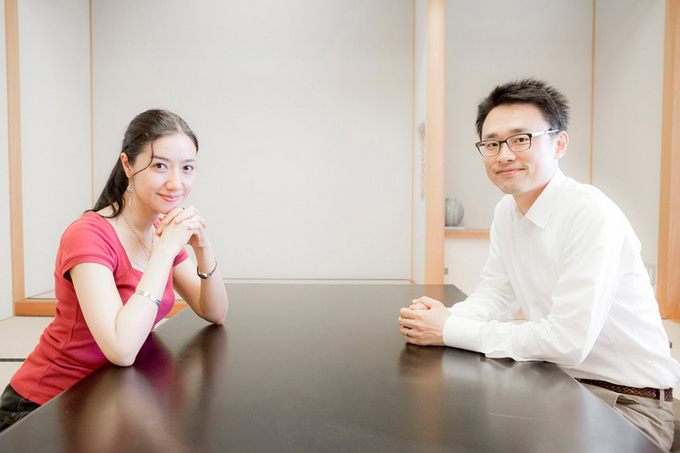
Karima Elsamny Morooka (on the left) and Ken Miichi (on the right)
Connecting Islam with Japan
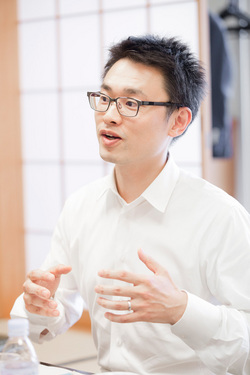 MIICHI: I use your essays Koisuru arabujin (Arabs in love) and Islam kara kangaeru in my classes at university.
MIICHI: I use your essays Koisuru arabujin (Arabs in love) and Islam kara kangaeru in my classes at university.
The course is called Foreign Area Studies and the main topic is Southeast Asia. But with students who are unfamiliar with Islam, I need to begin by talking about Islamic doctrines and duties. I teach them a general overview at the beginning, saying things like "Muslims pray five times a day," or "there's a month of fasting." But when I do that, I find that some students react by saying "I'm so glad I'm Japanese!" I think that trying to explain Islam can actually make it harder to get rid of such preconceptions. In that sense, I find your works to be perfect as educational material, because you know a lot about both Japan and Egypt, and you're in a position where you can see them objectively from the outside.
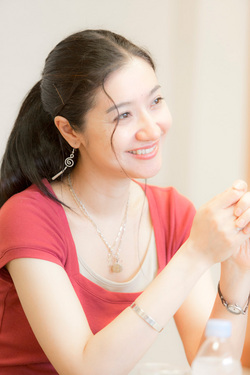 MOROOKA: Thank you very much. I too, teach a university course called Arabic Art and Culture, and like you said, if you want to learn about Arabic culture, you do need to have a basic knowledge of Islam. So I teach three or four classes on Islam before I move on to Arabic art. Of course I talk about Islamic doctrines and the law, but I think that perhaps because of the way I dress, students get the impression that Muslim life is not that different from life in Japan.
MOROOKA: Thank you very much. I too, teach a university course called Arabic Art and Culture, and like you said, if you want to learn about Arabic culture, you do need to have a basic knowledge of Islam. So I teach three or four classes on Islam before I move on to Arabic art. Of course I talk about Islamic doctrines and the law, but I think that perhaps because of the way I dress, students get the impression that Muslim life is not that different from life in Japan.
What prompted me to write my book Islam kara kangaeru was the incident with the satirical cartoons. (In September 2005, a Danish newspaper published satirical cartoons of Muhammad. This provoked an uproar among governments and people in Islamic countries and developed into a diplomatic issue) I hadn't originally intended to write a book on Islam, but after that incident, more people asked me to lecture on Islam; and I ended up talking a lot about what Islam is as a religion and what it is not, trying to change prejudices about Islam or speaking in its defense. For the most part, people expect me to talk from a subjective Muslim perspective, but I don't exactly have a subjective or objective view. I feel I'm somewhere in the middle, or in a different position altogether. But it's really tricky and difficult to communicate these views carefully.
It's often said that Japanese people don't know much about Islam, but considering the geographical and historical distance between the regions, I think it can't be helped. Even today, if the Japanese people misunderstand Islam--the common explanation is that this is because they've been exposed to biased information via western countries--I think the Islamic world is also responsible in the respect that they haven't made enough effort to explain themselves.
Looking at the diverse, far-ranging world of Islam from multiple angles
 MIICHI: Even among Muslims, sometimes Muslims of one country can have misconceptions about Muslims of another country. In Indonesia, there was a bestselling novel called Ayat-Ayat Cinta (meaning of "The Verses of Love") about an Indonesian man who studies in Egypt where his popularity with women gets him into trouble. To an outsider, it may seem like a comedy, but it was actually a serious, romantic novel; and it was made into a movie in 2008 which became a big hit, too. The story is basically about an Indonesian student marrying a Turkish-German woman, and taking a Coptic Egyptian woman who converts to Islam as his second wife. So, the premise is a bit absurd, but there were media reports that even Indonesian President cried watching it, and it was so popular so it went on to be screened in Malaysia and Singapore as well. One of the other aspects that attracted audiences to this movie was the stylish Islamic fashion, but I felt that it played with the kind of exoticism Southeast Asians feel towards the beauty of Arab countries. On one hand, it described the protagonist falling in love with a Middle Eastern woman as an equal, but on the other, it portrayed Egyptian men as being paternalistic, violent, and anti-American.
MIICHI: Even among Muslims, sometimes Muslims of one country can have misconceptions about Muslims of another country. In Indonesia, there was a bestselling novel called Ayat-Ayat Cinta (meaning of "The Verses of Love") about an Indonesian man who studies in Egypt where his popularity with women gets him into trouble. To an outsider, it may seem like a comedy, but it was actually a serious, romantic novel; and it was made into a movie in 2008 which became a big hit, too. The story is basically about an Indonesian student marrying a Turkish-German woman, and taking a Coptic Egyptian woman who converts to Islam as his second wife. So, the premise is a bit absurd, but there were media reports that even Indonesian President cried watching it, and it was so popular so it went on to be screened in Malaysia and Singapore as well. One of the other aspects that attracted audiences to this movie was the stylish Islamic fashion, but I felt that it played with the kind of exoticism Southeast Asians feel towards the beauty of Arab countries. On one hand, it described the protagonist falling in love with a Middle Eastern woman as an equal, but on the other, it portrayed Egyptian men as being paternalistic, violent, and anti-American.
MOROOKA: In Egypt, there's no way a Coptic Christian would convert to marry a Muslim. That would create a huge fuss. And the fact that Egyptian men are described like that ... I wonder what the Egyptians would say.
MIICHI: I don't think the people of the Middle East are usually conscious of the Muslim presence in Southeast Asia, so it would probably seem very strange to them. I think it's important to be aware that the Muslim world is very diverse, and to always remember that you can't blame Islam for everything that happens in Muslim society, and you can't explain everything by tying it into Islam. The rules and traditions that are believed to be particularly Islamic may actually be found in any society in any region. You can sometimes find commonalities with Japanese society too.
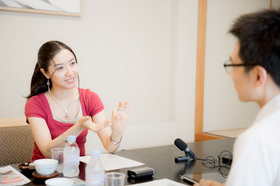 MOROOKA: Yes. What we often see is that, when there's an incident in the Islamic world, most people who try to explain it in terms of Islam tend to define the action of one Muslim as "Islamic." The thing is though, if you had ten Muslims, even of the same nationality, each of them would act differently. But still, people will try to explain one individual's action as being Islamic. It's such a loose explanation that ordinary Muslims would think, "Hey, wait a minute."
MOROOKA: Yes. What we often see is that, when there's an incident in the Islamic world, most people who try to explain it in terms of Islam tend to define the action of one Muslim as "Islamic." The thing is though, if you had ten Muslims, even of the same nationality, each of them would act differently. But still, people will try to explain one individual's action as being Islamic. It's such a loose explanation that ordinary Muslims would think, "Hey, wait a minute."
For example, when I ask Japanese university students to read Arabic novels, if a character acts in an unexpected way, they think it's because he or she is a Muslim. So, as a teacher, I ask them not to think of it that way, and I encourage them instead to ask themselves why this person acted in this way.
In other words, the story may be set in Islamic society, but it might simply be that the protagonist is eccentric. Maybe his actions have nothing to do with the fact that he's Muslim and he's doing it in spite of being a Muslim. I try to teach that frame of mind in my classes.
Even with scholars and journalists who analyze things as a profession, when they encounter actions they've never seen before, even if it's only one example, they end up concluding that it's an Islamic thing. Since the media has great influence in such matters, these inaccurate views get exaggerated and widely repeated. I think that's one of the problems.
MIICHI: The Muslim side also tends to explain things by simply saying "it's because it's Islam" and that doesn't help either.
MOROOKA: Yes, that's right. That's why I think Muslims bear great responsibility, too. For example, in Dostoyevsky's novel, Demons, there's a scene where a character gives a pompous speech saying that a great nation needs to have a god different from the gods of other nations, and I think there are a few Muslims who think like that. Muslims use the word ummah (community), and I think there is a tendency to believe that in order to show the power of the ummah, they need to emphasize how different they are from others. So, there are Muslims who emphasize differences, but on the other hand, there are also ordinary Muslims in Japan who are very happy with their life here. I don't think they are unhappy with how they're treated in Japan.
The Islamic world in Japan and Japan in the Islamic world
MIICHI: Certainly, I haven't heard many complaints from the Indonesian Muslims in Japan about Japanese attitudes or perceptions against them regarding their identity as Muslims.
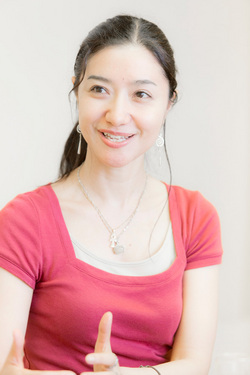 MOROOKA: Yes, I agree. Arab Muslims are very happy, too. For example, if a Japanese person invites them over to dinner, the host will say, "We won't serve any pork because you're Muslim," and they accept the fact that Muslims don't drink alcohol as a very natural thing. I think Muslims have the impression that, whether the Japanese people have biased views about Islam or not, when they get to know each other on an individual basis, people in Japan try to be mindful and tolerant of Muslim customs.
MOROOKA: Yes, I agree. Arab Muslims are very happy, too. For example, if a Japanese person invites them over to dinner, the host will say, "We won't serve any pork because you're Muslim," and they accept the fact that Muslims don't drink alcohol as a very natural thing. I think Muslims have the impression that, whether the Japanese people have biased views about Islam or not, when they get to know each other on an individual basis, people in Japan try to be mindful and tolerant of Muslim customs.
So until quite recently, I'd been saying that there was no need to preach tolerance in Japan since the Japanese are already tolerant enough. But I must say after listening to a couple of stories, I've had to rethink my view.
I have a Japanese friend who became a Muslim and wears a veil, and she went shopping in the Ameyoko area in Ueno with an Indonesian friend of hers, both of them wearing veils. They went into an old store and the owner was very kind to them. Both of them had been talking in English at first, but after they decided on what to buy, my Japanese friend spoke to the owner in Japanese. Then, the man changed his tone, saying, "You're Japanese?" And after she replied, "Yes, I am," she was given a lecture along the lines of "Why are you dressed like that even though you're Japanese?"
So, though I say "The Japanese are tolerant towards Islam," it's probably because the Japanese see me as a foreigner. When I talk to Japanese Muslims, though, they say that's not really how it is. So there may be less tolerance in terms of Islam as a whole.
That's why, rather than thinking about how to connect the Islamic world and Japan, I think it's more about how to connect Islam itself and Japan. There's a tendency to lump together countries where most of the population is Muslim as "the Islamic world", but it's not as if there's an Islamic world and a non-Islamic world. For example, although there are more Indian Muslims than the entire population of Japan, India is not described as an "Islamic country". Thus, Islam is not a world defined by geographical borders. I mean, Muslims also live in Japan and there are Japanese Muslims, too.
 MIICHI: If non-Japanese Muslims feel comfortable living in Japan, I think it's because the Japanese don't have a historical or religious background that would make them see Muslims as a particular threat. They don't share the fear that Westerners have of Muslims destroying their culture. These days, perhaps, the Japanese feel that kind of frustration towards China or have an emotional reaction of the increase in the number of Chinese people in Japan. Though there are more second- or third-generation Muslims in Japan now, in any case, the number is not very large. Maybe the situation would change if we saw a surge in that number.
MIICHI: If non-Japanese Muslims feel comfortable living in Japan, I think it's because the Japanese don't have a historical or religious background that would make them see Muslims as a particular threat. They don't share the fear that Westerners have of Muslims destroying their culture. These days, perhaps, the Japanese feel that kind of frustration towards China or have an emotional reaction of the increase in the number of Chinese people in Japan. Though there are more second- or third-generation Muslims in Japan now, in any case, the number is not very large. Maybe the situation would change if we saw a surge in that number.
Nevertheless, I think more and more people in Japan want to learn about the various aspects of Islam. And I believe the people in Southeast Asia are very interested in Japan and have positive views towards the Japanese since the countries are geographically close. How do the Arab people see Japan?
MOROOKA: The Arabs think of Japan as an economic and a technological giant, or a country of polite and hard-working people from whom much can be learned.
But that's just an impression they have from what they see on the surface. I've been working with NHK World's Arabic radio broadcast for Arab audiences, and I think there's a new trend in the way they see Japan.
Recently, Japan has been putting a lot of effort into promoting its pop culture overseas, and NHK's Arabic broadcast has also been producing programs that feature Japanese pop culture. So, we might do a program featuring Hello Kitty, where we'd talk about Hello Kitty for 20 minutes straight. Or, Hatsune Miku, or something like that. At first, since it wasn't exactly my type of thing, I was skeptical, thinking, "Would this be interesting to the Arab people?" But the impact was huge.
It turns out that the new generation of Arabs, some youngsters in Saudi Arabia and the Arab states of the Gulf, are very interested in Japanese pop culture. For example, they not only listen to Goth music, but they also give themselves Goth names and send emails to the program signed with those names. Or they dub Japanese anime themselves and upload them on YouTube.
I thought Japanese pop culture wasn't for the Arab people, but I was wrong. The Arab youth, especially the young people in the Gulf region, is following Japanese culture very closely.
It's something I learned quite recently. There are people all over the world, maybe not the majority of society, but people in every country who have a real affinity for Japanese pop culture such as anime. So, in that sense, definitely, there are people watching Japan.
MIICHI: In Southeast Asia, perhaps because Japanese pop culture is more widespread, sometimes you see people on Facebook, seemingly with strict religious views or expressing strong anti-American feelings, bizarrely choosing Doraemon as their icon. In your essays, you reject the simple opposition of Islam and the West, and say that it's encouraging to see the flexibility of the younger generation, adopting and enjoying their favorite bits of various cultures as they please.
MOROOKA: True. In the future, I hope that people won't think of Islam as something out of the ordinary, or feel that they have to be especially careful about how they treat Muslims. Even if you're of the same nationality, you need to be considerate of the other person's feelings or personality to get along with each other. So my hope is that the Japanese relationship with Muslims will be a natural extension of that.
Interview recorded at the Japan Foundation on May 31, 2012.
Photos by Kenichi Aikawa
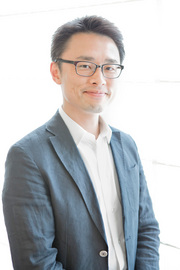 Ken Miichi
Ken Miichi
Associate Professor of Policy Studies at Iwate Prefecture University. Completed a PhD course at the Graduate School of International Cooperation Studies, Kobe University. (His PhD thesis was awarded the 2002 Asia Pacific Research Prize (Iue Prize)). Author of Indonesia: Islam shugi no yukue (The Fate of Islamism in Indonesia) and others.
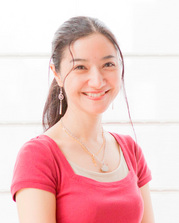 Karima Elsamny Morooka
Karima Elsamny Morooka
Born in Tokyo and grew up in Cairo. Graduated from Cairo University and University of London. Lecturer at Dokkyo University and Keio University. Arabic broadcaster for NHK World Radio Japan. Currently appears as a guest in the culture section of NHK television's Terebide arabiago (Learn Arabic on Television).
Author of Arabiago no katachi (The shape of Arabic), Koisuru arabujin (Arabs in love), and Islam kara kangaeru (Thinking from the Islamic perspective).
Related Events
Keywords
- Anime/Manga
- Pop Culture
- Culture and Society
- Philosophy/Religion
- History
- Japan
- Indonesia
- Singapore
- Malaysia
- India
- Saudi Arabia
- Egypt
- Islam
- Muslim
- Middle East
- Arabs in love
- Islam kara kangaeru
- Foreign Area Studies
- Southeast Asia
- Egypt
- Arab
- Satirical cartoon
- Muhammad
- Coptic Christian
- Exoticism
- Orientalism
- Dostoyevsky
- Ummah
- NHK WORLD
- Arabic language
- Hello Kitty
- Hatsune Miku
- Goth
- YouTube
- Doraemon
Back Issues
- 2025.11.14 Stories from Both Si…
- 2025.10.24 Dialogue through Ani…
- 2025.6. 9 Creating a World Tog…
- 2024.10.25 My Life in Japan, Li…
- 2024.5.24 The 50th Japan Found…
- 2024.5.24 The 50th Japan Found…
- 2024.5. 2 People-to-People Exc…
- 2024.5. 2 People-to-People Exc…
- 2023.12. 7 Movie Theaters aroun…
- 2023.6.16 The 49th Japan Found…


